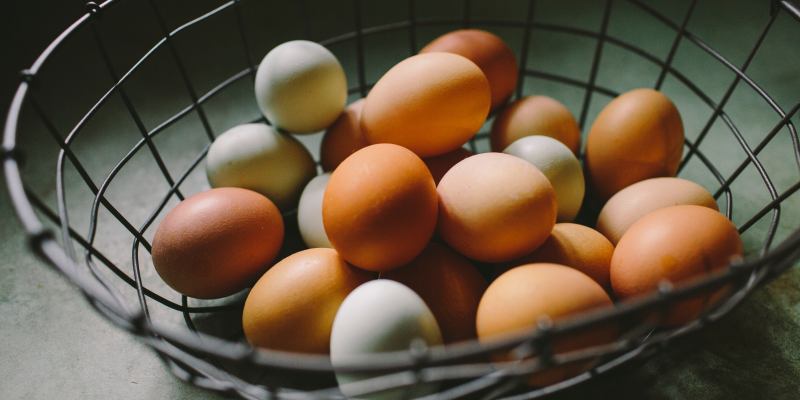
Eggs 101: How to Spot a Healthy Egg
We’ve talked about what to look for when shopping for eggs and cooking eggs, but how do you really know if the egg you’re eating is the healthiest option? Here are a few tips and insights to help you navigate through your choices.
Brown eggs aren’t any healthier than white ones.
White eggs can be extremely nutritious, just as brown eggs can be extremely non-nutritious (depending on the hen’s feed and living conditions). The ONLY determining factor in the color of the egg is the breed of the chicken.
Pasteurized eggs aren’t healthy.
The pasteurization process can be described as a “water bath” that heats the egg “to the exact temperature needed to destroy all bacteria” within the egg. The idea of killing all of the bacteria in eggs for safety reasons sounds nice, but completely neglects the innate defense mechanisms that eggs are naturally equipped with (like the bloom- more on this later).
The pasteurization process also wipes out all the good bacteria within the egg (some bacteria is necessary for proper digestion) and could also have a negative impact on the egg’s vitamin and mineral content.
There’s one thing that pasteurization and the other misconceptions listed above all have in common. They’re products of a culture that continues to (unsuccessfully) try to out-do what nature has already perfected.
So instead of working against nature (and failing) doesn’t it make more sense to work with it in order to achieve optimal results — from a nutritional, humane, and environmental standpoint?
Pastured eggs are healthier.
Remember that a healthy egg can only come from a healthy hen. So if a hen is free to move through fresh pasture every day, eating grasses packed with micronutrients and foraging for bugs, then all those awesome nutrients will accumulate in the egg.
Eggs that come from pasture-raised hens contain two-thirds more vitamin A, 2 times more omega-3, 3 times more vitamin E, 7 times more beta-carotene, and 4-6 times more Vitamin D than standard store-bought eggs (even if they’re Organic and/or free-range).

Dirty eggs? No problem.
All eggs come out with a natural protective coating called a “bloom.” The bloom seals the pores of the eggshell and protects the egg from harmful bacteria and moisture loss. So if you get eggs from truly pasture-raised chickens (or if you’re raising your own egg-layers in your backyard) don’t be afraid of the dirt or grass you find on the eggs, they’re safely sealed with the protective bloom. You'll just need to wash them right before you eat them.
Most major commercial egg operations wash their eggs, stripping them of this natural protective barrier long before they're ready to be eaten. Not only are these eggs washed, but often bleached (pretty troubling considering how porous egg shells are without the bloom) so that the consumer can take home a very pretty (but extremely unnatural) egg that’s more susceptible to salmonella and other pathogens.
Some conventional eggs are re-coated with mineral oil or wax in an effort to replicate the bloom. But let’s be honest — when have man-made interventions ever worked as well as the real deal?
Pastured eggs don’t need to be refrigerated.
Because of their bloom, unwashed pastured eggs can be safely kept out of the refrigerator for up to 3 months!
But the law does require all retailed eggs to be refrigerated (even pastured, unwashed ones) and I wouldn’t advise putting most eggs anywhere other than the fridge — unless you raised them yourself or know and trust your farmer.
So where can I find pastured eggs?
When it comes to eggs, the best thing to do is raise your own. With laying hens in your backyard, you'll have full confidence that your eggs are coming from healthy chickens, and you'll get to enjoy the absolute freshest eggs possible.
And if you want to skip the brooding-stage, and waiting game, check out our Live Started Laying Hens to start your backyard flock. The hens have already started laying, and are ready to go for your backyard. You can also use the same supplemental feed we use, to keep them healthy and producing the most nutritious eggs: Small Batch Organic Chicken Feed, or contact info@primalpastures for more information.
If you don't have a yard, check out EatWild.com is an excellent resource for finding local, sustainable egg and meat farms (but be sure to also do your own research on whatever farm you buy from).

